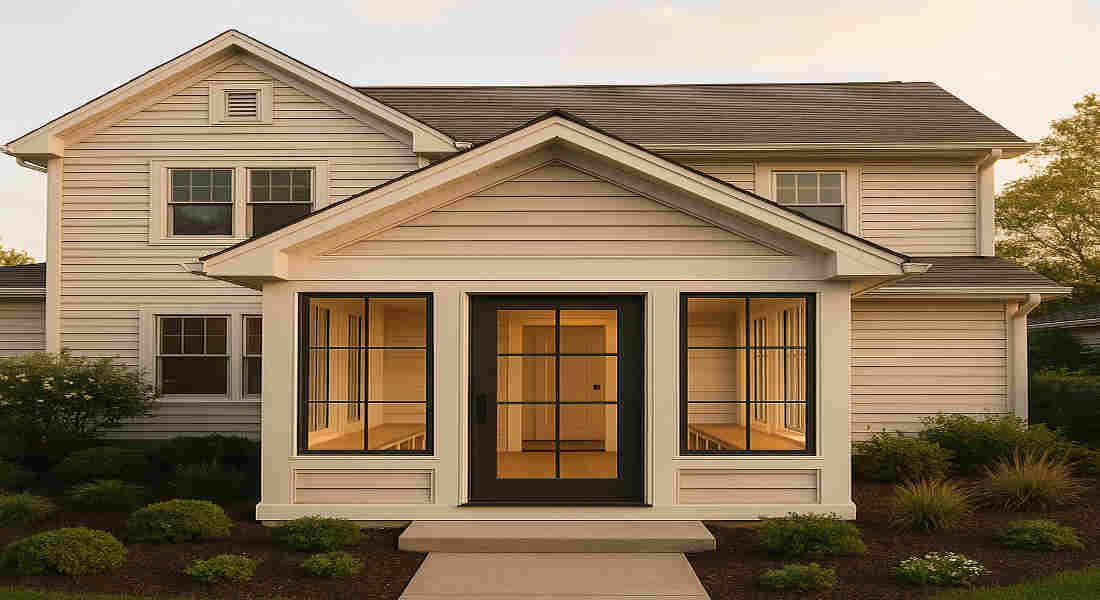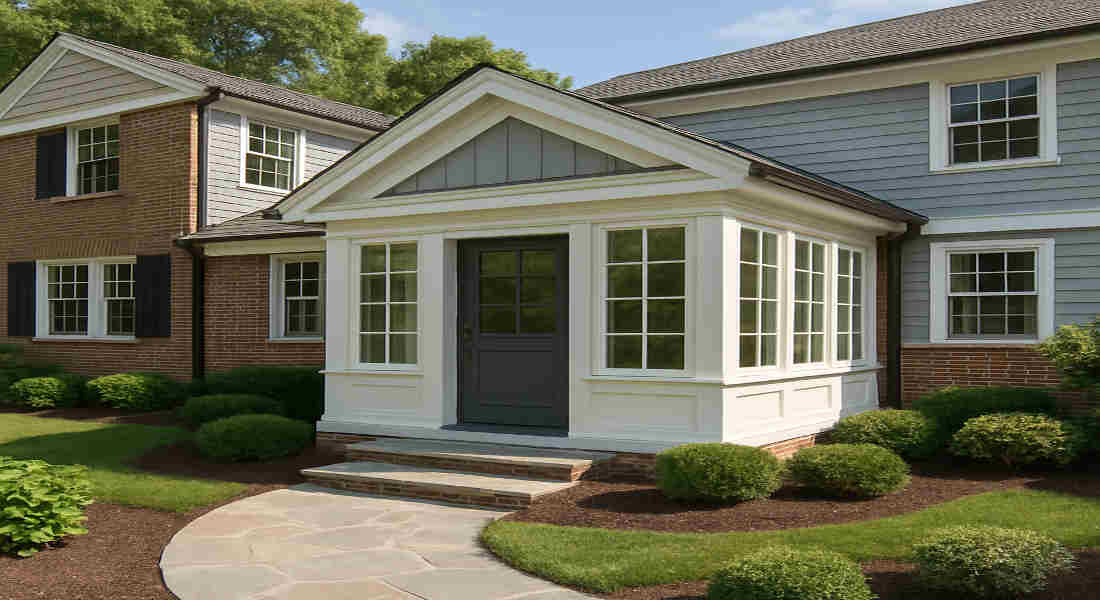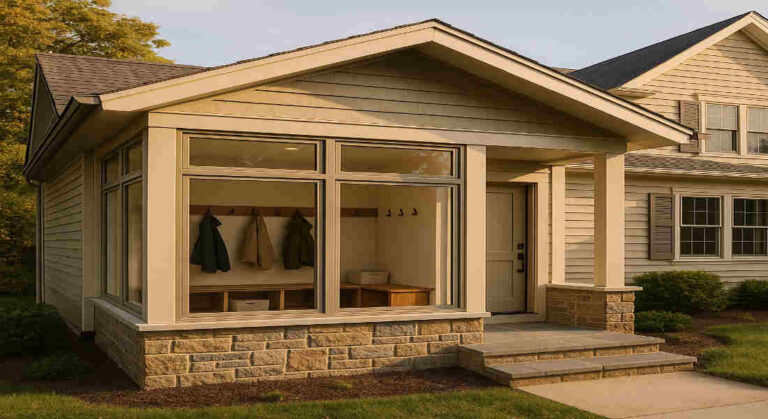Designing a mudroom addition for your home is a smart way to create a practical, organized space that helps manage daily clutter and keeps your living areas cleaner. A well-designed mudroom serves as a secondary entrance where family members can store shoes, coats, bags, and sports equipment, making transitions from outdoors to indoors smooth and efficient. When planning your mudroom addition, key considerations include selecting the correct location—often near the kitchen or laundry room for convenience—maximizing storage with built-in cabinets, cubbies, and hooks and choosing durable, easy-to-clean flooring materials that can withstand mud and moisture. Thoughtful layout and lighting will ensure the space is both functional and welcoming, complementing your home’s style. Whether you opt for a bump-out addition or repurpose an existing area, a mudroom can add valuable square footage and enhance your home’s daily functionality.
What is a Mudroom, and Why Should You Consider Adding One?
A mudroom is a designated space in your home, typically located near the entrance, that serves as a transitional area between the outside world and your living areas. It’s where shoes are taken off, coats are hung up, and bags can be stashed away.
Having a mudroom offers countless benefits for families of all sizes. It helps keep dirt and debris from spreading throughout the house. Instead of tracking in leaves or mud after an outdoor adventure, you have a dedicated zone to manage it all.
This space also provides valuable storage solutions. From cubbies for each family member to hooks for jackets and shelves for gear, it promotes organization right at your entryway.
With increasing flexibility in design options, adding a mudroom not only elevates functionality but also enhances also enhances your home’s overall appeal. Whether you’re after rustic charm or modern flair, there’s room to customize this essential addition.
Identifying the Right Location for Your Mudroom
Choosing the correct location for your mudroom is crucial. Consider how it relates to your daily life. The entryway from the garage often makes sense, allowing for easy access to unload groceries or sports gear.
Consider proximity to outdoor spaces as well. If you have a yard or garden, placing the mudroom near an exterior door can keep dirt and debris contained.
Natural light enhances any space, so select an area with windows. This not only brightens up the room but also creates a welcoming atmosphere.
Don’t forget to consider the flow within your home. Ensure that this new addition doesn’t disrupt existing pathways or rooms. A well-placed mudroom should blend seamlessly with other areas of your house.
You may also read (uncovering the mystery of ants in your home).
Designing the Layout and Storage Options
When designing your mudroom addition at the front of the house, focus on functionality. Begin by evaluating how you utilize the space daily. Consider traffic flow; ensure it’s easy to navigate for everyone.
Next, plan storage solutions that cater to your lifestyle. Built-in shelves can hold shoes and bags, while hooks keep coats organized and accessible. A combination of open and closed storage allows for both display and concealment.
Think vertically as well. Tall cabinets or wall-mounted racks maximize space without crowding the floor area.
Don’t forget to designate a spot for seasonal items, such as holiday decorations or outdoor gear. Including baskets or bins can help keep everything tidy while adding a decorative touch.
Create zones within the layout, such as an entryway nook for quick access items versus deeper storage areas for less frequently used belongings. This strategic organization will enhance both usability and aesthetics.
Choosing Materials and Finishes
When selecting materials for your mudroom addition, consider durability first. You want surfaces that can withstand heavy use and resist stains.
For flooring, tile or luxury vinyl planks are excellent choices. They’re easy to clean and withstand muddy shoes and spills well.
Wall finishes should be both functional and stylish. Consider beadboard or shiplap for a classic look that’s also easy to wipe down.
Storage solutions, such as cabinets, can benefit from moisture-resistant finishes or paint, ensuring they remain in good condition despite the wear and tear of everyday life.
Don’t forget about color palettes—light colors can make the space feel larger, while darker hues may hide dirt better. Choose wisely based on how you plan to use this area on a daily basis.
Textures also add character; mixing smooth surfaces with rustic elements creates an inviting atmosphere perfect for a family home after a long day outdoors.
You may also read (step by step guide to taking your house off the market).
Incorporating Functional Features such as Benches and Hooks
When designing a mudroom addition, functionality should be at the forefront. Adding benches offers a convenient spot for removing shoes and bags. They provide comfort while also serving as extra storage underneath.
Hooks are essential in keeping your space organized. Install a variety of hook styles at different heights to cater to both adults and children. This way, everyone can easily hang their coats and backpacks without cluttering up the floor.
Consider integrating built-in shelves above the bench for additional storage options. These shelves can hold baskets or bins that neatly store smaller items, such as gloves, hats, or dog leashes.
Lighting is equally essential; bright overhead lights, combined with natural light from nearby windows, will enhance usability at any time of day. Select finishes that complement your overall design while remaining durable enough to withstand daily wear and tear.
Budgeting for Your Mudroom Addition
Budgeting for your mudroom addition involves careful planning. Start by determining how much you’re willing to spend. Think about both construction and design costs.
Get quotes from contractors if you’re hiring help. This gives you a clearer picture of labor expenses. Don’t forget to factor in permits and inspections required by local authorities.
Materials can vary widely in price, so research options that fit your style and budget. Choose affordable laminate flooring or splurge on hardwood.
These features enhance functionality but can add to the overall cost.
just in case unexpected issues arise during the construction process. Flexibility is key when dealing with home renovations; be prepared for changes along the way!
DIY vs. Hiring a Professional Contractor
When considering a mudroom addition in front of the house, the choice between DIY and hiring a professional contractor can be pivotal. If you’re handy with tools and enjoy home improvement projects, tackling it yourself might be an exciting challenge.
However, keep in mind that building codes and regulations can complicate things. A professional contractor brings expertise to ensure everything meets local standards.
On the other hand, professionals streamline the process. They manage timelines efficiently and often have access to better materials at competitive prices.
If you opt for a DIY approach, preparation is key. Research designs thoroughly and gather all necessary tools before starting your project.
Consider your skill level against potential pitfalls when deciding which route to take for your mudroom addition.
Tips for Maintaining and Organizing Your Mudroom Space
Maintaining and organizing your mudroom space is essential for maximizing its functionality. Start with a regular cleaning routine to keep dirt and debris at bay. Consider implementing storage solutions that work for you, such as labeled bins or baskets for shoes, hats, and gloves.
Use hooks or wall-mounted racks to store jackets and bags conveniently. This not only keeps items off the floor but also makes them easily accessible when you’re in a hurry.
Set up a small area for seasonal items, rotating out sports gear or winter coats as needed. Consider incorporating a shoe tray near the entrance to catch moisture and keep the area tidy.
Encourage family members to contribute by making it their responsibility to return items to their designated locations after use. A well-organized mudroom addition in front of the house can be an inviting entry point that adds value both practically and aesthetically.
You may also read (guide to purchasing a home for cash do you need a lawyer).

